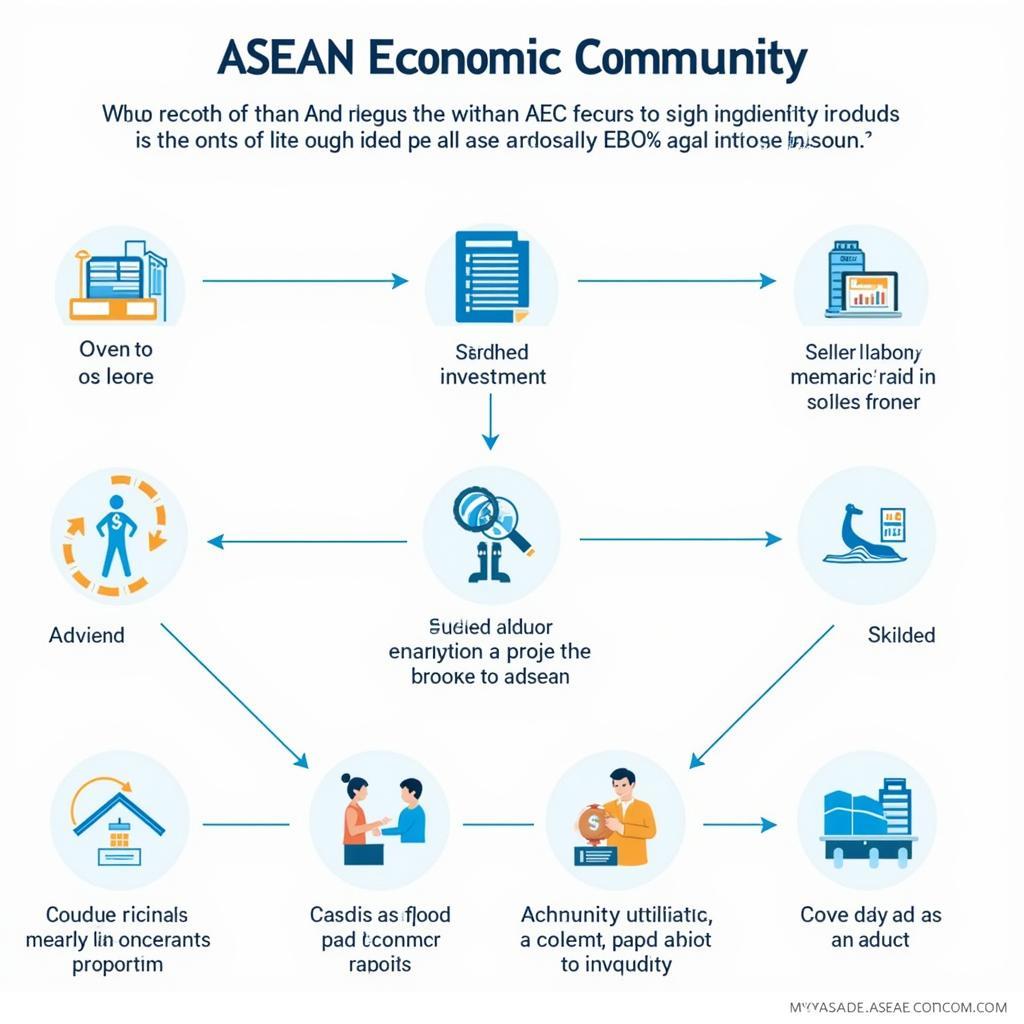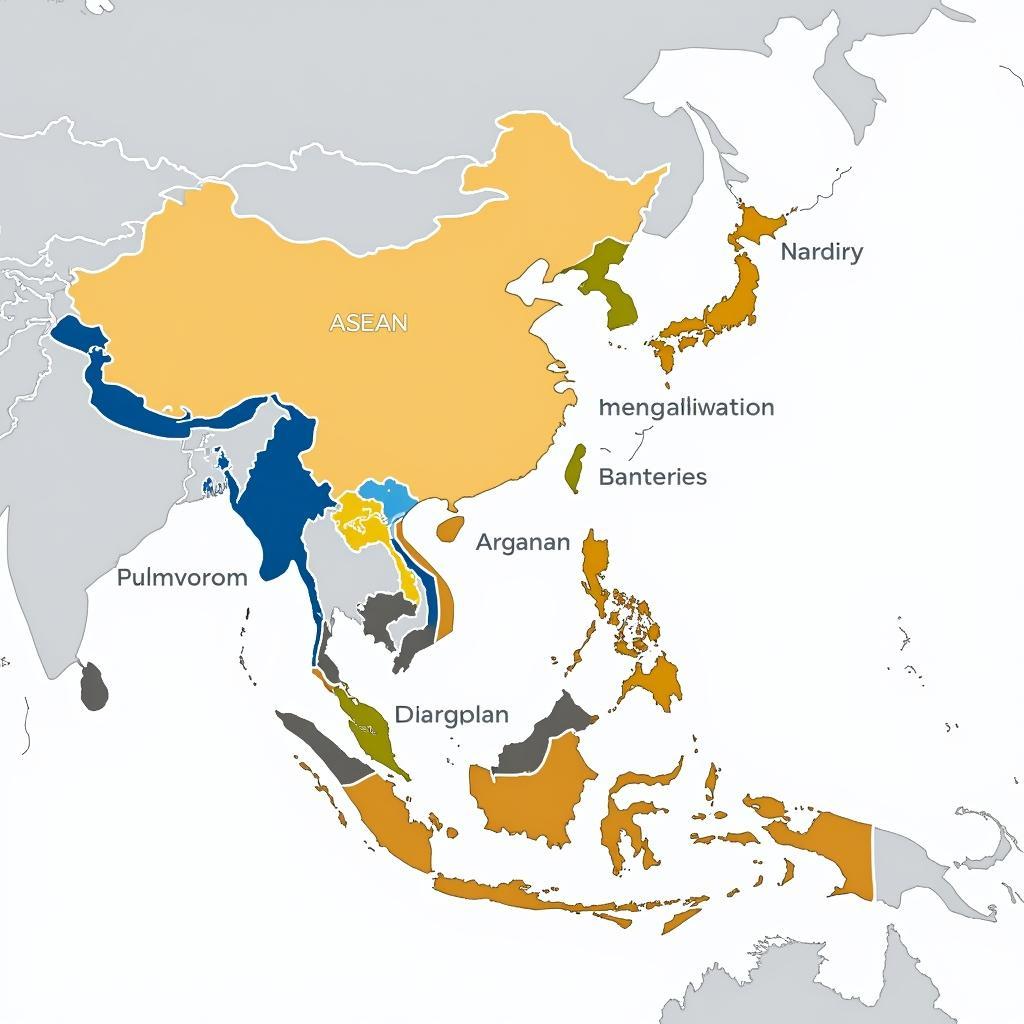ASEAN meaning is often sought after by those curious about Southeast Asia’s prominent intergovernmental organization. The Association of Southeast Asian Nations (ASEAN) represents a powerful force for economic growth, political stability, and socio-cultural exchange in a vibrant region. But what does ASEAN truly stand for, and what is its significance on the global stage? This article delves into the core meaning of ASEAN, exploring its history, objectives, and impact on the region and the world.
Delving into the ASEAN Meaning: History and Formation
The foundation of ASEAN rests on the Bangkok Declaration, signed in 1967 by five founding nations: Indonesia, Malaysia, the Philippines, Singapore, and Thailand. Driven by a shared desire for peace and stability amidst the Cold War tensions, these nations envisioned a future of cooperation and mutual respect. The “ASEAN meaning” at this nascent stage encompassed a commitment to regional solidarity and the peaceful resolution of disputes.
Over the years, ASEAN’s membership expanded, welcoming Brunei Darussalam, Vietnam, Laos, Myanmar, and Cambodia. This expansion further enriched the “ASEAN meaning,” reflecting a broader and more inclusive representation of Southeast Asia’s diverse tapestry of cultures and political systems.
ASEAN Meaning in Action: Key Objectives and Principles
The core “ASEAN meaning” can be understood through its fundamental principles, which guide its actions and shape its identity. These principles emphasize mutual respect for sovereignty, territorial integrity, non-interference in internal affairs, and the peaceful settlement of disputes. They also promote regional cooperation in various fields, including economic development, social progress, and cultural exchange.
ASEAN’s objectives are multifaceted, encompassing economic integration through initiatives like the ASEAN Economic Community (AEC), the promotion of peace and security through dialogues and confidence-building measures, and the fostering of a shared ASEAN identity.
What does ASEAN mean for its citizens? It means increased opportunities for trade and investment, enhanced mobility across borders, and a stronger voice on the international stage.
 ASEAN Economic Community Fostering Regional Integration
ASEAN Economic Community Fostering Regional Integration
ASEAN Meaning in the 21st Century: Challenges and Opportunities
The “ASEAN meaning” continues to evolve in a dynamic global landscape. The organization faces complex challenges, including territorial disputes, environmental concerns, and the rise of non-traditional security threats. However, ASEAN’s strength lies in its ability to adapt and innovate, leveraging its collective resources and diplomatic channels to address these issues.
What does ASEAN mean in the context of globalization? It represents a regional bloc with growing economic clout and geopolitical significance. ASEAN’s strategic partnerships with major powers like the United States, China, and Japan underscore its importance in international affairs.
“ASEAN’s success lies in its ability to bridge diverse perspectives and forge a common path forward,” says Dr. Anya Sharma, a prominent Southeast Asian Studies scholar at the National University of Singapore. “The organization provides a platform for dialogue and cooperation, fostering a sense of shared purpose among its member states.”
 ASEAN Engaging in Global Partnerships
ASEAN Engaging in Global Partnerships
Conclusion: The Enduring ASEAN Meaning
The “ASEAN meaning” encapsulates a journey of regional cooperation, resilience, and shared aspirations. From its humble beginnings, ASEAN has emerged as a vital force in Southeast Asia, driving economic growth, promoting peace and stability, and fostering a sense of community. As the region navigates the complexities of the 21st century, ASEAN’s role in shaping a prosperous and interconnected future remains paramount.
FAQ
- What does ASEAN stand for?
- ASEAN stands for the Association of Southeast Asian Nations.
- How many countries are in ASEAN?
- There are ten member states in ASEAN.
- What is the main goal of ASEAN?
- ASEAN’s primary goal is to promote regional cooperation in various fields, including economic, political, social, and cultural spheres.
- When was ASEAN established?
- ASEAN was established in 1967 with the signing of the Bangkok Declaration.
- What are some of ASEAN’s key achievements?
- Some key achievements include the establishment of the ASEAN Economic Community (AEC), the promotion of peace and security through dialogues, and the fostering of a shared ASEAN identity.
- What challenges does ASEAN face?
- ASEAN faces challenges such as territorial disputes, environmental concerns, and non-traditional security threats.
- How does ASEAN benefit its member states?
- ASEAN benefits its members through increased trade and investment opportunities, enhanced mobility, and a stronger voice on the international stage.
Scenarios
- Scenario 1: A business owner wants to expand their operations into Southeast Asia. ASEAN provides a framework for understanding the regional market and navigating the regulatory landscape.
- Scenario 2: A student is researching the history and political dynamics of Southeast Asia. ASEAN’s history and evolution offer valuable insights into the region’s complexities.
- Scenario 3: A traveler is planning a trip to Southeast Asia. ASEAN’s initiatives on visa facilitation and tourism promotion can enhance their travel experience.
Further Exploration
- Explore our article on the ASEAN Economic Community (AEC) for a deeper understanding of regional economic integration.
- Learn more about ASEAN’s role in promoting peace and security in Southeast Asia through our dedicated section on conflict resolution.
- Discover the rich cultural diversity of ASEAN member states through our articles on cultural heritage and traditions.
Need further assistance? Contact us 24/7 at Phone: 0369020373, Email: [email protected] or visit us at: Thon Ngoc Lien, Hiep Hoa, Bac Giang, Vietnam.

